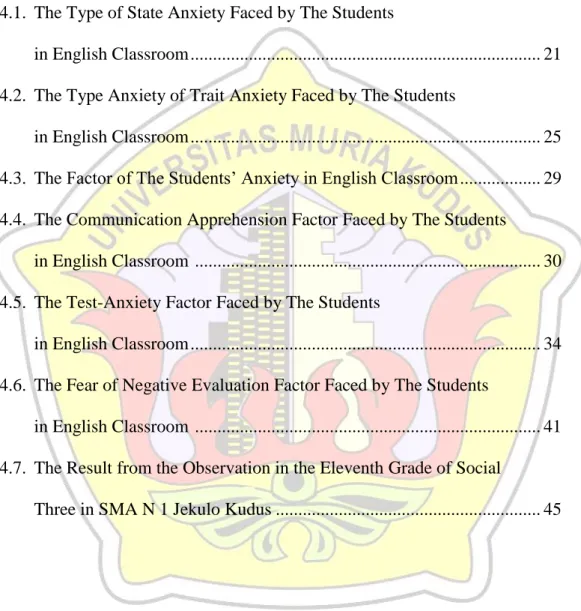SKRIPSI
STUDENTS’ ANXIETY IN ENGLISH CLASSROOM
(A Case Study at SMA N 1 Jekulo Kudus in Academic Year 2016/2017)
By
Nurul Mela Sari NIM 201232005
DEPARTMENT OF ENGLISH EDUCATION FACULTY OF TEACHER TRAINING AND EDUCATION
UNIVERSITY OF MURIA KUDUS 2017
iii
STUDENTS’ ANXIETY IN ENGLISH CLASSROOM
(A Case Study at SMA N 1 Jekulo Kudus in Academic Year 2016/2017)
SKRIPSI
Presented to the University of Muria Kudus in Partial Fulfillment of the Requirements for Completing the Sarjana Program in the Department of English Education
By
Nurul Mela Sari NIM 201232005
ENGLISH EDUCATION DEPARTMENT
TEACHER TRAINING AND EDUCATION FACULTY MURIA KUDUS UNIVERSITY
iv
MOTTO AND DEDICATION
Motto:
Don’t lose the faith, keep praying, and keep trying.
If you fall a thousand times, stand up millions of times because you do not know how close you are to success.
Dedication:
This skripsi is dedicated to:
The writer’s beloved parents, little sister and family, who always give her support and blessing.
All lecturers of English Education Department.
The writer’s beloved best friends Atin, Dwi, Ida, Tya, Elina, Nia, Dita, Windy, Tahta and Naila.
All of the writer’s friends of English Education Department in 2012.
vii
ACKNOWLEDGEMENT
In the name of Allah SWT The Most Beneficient and The Most Merciful. All praises are to Allah SWT for all the blesses so that the writer can accomplish this skripsi.
Sholawat and salam may be given to prophet Muhammad SAW who has taken all human being from darkness to the lightness. It is her pleasure to
acknowledge the following people for their contribution to the writing this skripsi. The writer would like to express her genuine gratitude to:
1. Drs. Slamet Utomo, M.Pd. as the dean of Teacher Training and Education Faculty Muria Kudus University.
2. Diah Kurniati, S.Pd. M.Pd. as the head of English Education Department of Muria Kudus University.
3. Dr. H.A. Hilal Madjdi M.Pdas the first advisor and Mutohhar, S.Pd, M.Pdas the second advisor who give guidance, patience, help, and valuable advice to the writer in doing the research.
4. All lecturers and staff of English Education Department Teacher Training and Education Faculty of Muria Kudus University for their guidance and knowledge that have been given during the writer study at Muria Kudus University.
5. Mr. Joko Sutrisno, M.Pd as the headmaster of SMA N I Jekulo Kudus and Mrs. Marfuah S.Pd as the English Teacher at XI IPS 3 of SMA N I Jekulo Kudus for their help during the research.
6. Her beloved family especially for her parents who always take care and support her everytime.
7. For all her friends, thanks for your support and suggestion.
Finally, the writer hopes this skripsi will be useful and give advantages for everyone who deals with teaching and learning English.
Kudus, February 22nd,2017
viii ABSTRACT
Sari, Nurul Mela. 2017.Students’ Anxiety in English Classroom (A Case Study at SMA N 1 Jekulo Kudus in Academic Year 2016/2017). Skripsi. English Education Department of Teacher Training and Education Faculty of Muria Kudus University. Advisor: (1) Dr. H.A. Hilal Madjdi M.Pd (2) Mutohhar, M.Pd.
Key words: Anxiety, English Classroom
The differences in success and failure of the students in English classroom as a foreign language may have several reasons. The most familiar reason in our society that may contribute in increasing or decreasing in the English learning are; the intelligence quotient, the languages differences, and the methods that used in teaching learning process. Other believes there some emotional factors of the students, which influence in foreign language learning; intelligence, motivation, attitudes, and anxiety.
The purpose of this research is to find the types of anxiety faced by the students and also to find out the factors that contribute to the anxiety faced by the students of the eleventh grade social three of SMA N 1 Jekulo Kudus in academic year 2016/2017.
This research is qualitative research and the design of this research was descriptive qualitative research. The instrument that the writer used was questionnaire and observation. There were two questionnaires. The first questionnaire was divided into two; it was state anxiety and trait anxiety. The second questionnaire was divided into three; it was communication apprehension, test anxiety, and fear of negative evaluation.
The result of this research shows from the students’ answer from the questionnaire. From the first questionnaire the calculation showed that the dominant types of anxiety was trait anxiety the percentage was 51% and followed by state anxiety which the percentage was 49%. It means that the eleventh grade social three of SMA N 1 Jekulo Kudus generally anxious when they were learning English in the class. They were like failed if they lack confidence and got negative feedback from their teacher and friends. From the second questionnaire the calculation showed that the dominant factor of anxiety was test-anxiety the percentage was 46%, followed by communication apprehension and the percentage 33% and fear of negative evaluation with the percentage 22%. It means that the most of the students of the eleventh grade of social three had problem in test-anxiety. They were worry if they failed in English test because they lack of preparation, were too much expectation of the result test and unpleasant experience in the past.
Based on the conclusion, the writer offers several suggestions to cope anxiety in learning English. The teacher should consider the activities before being applied in the class in order to decrease the student’s anxiety and to make students feel more comfortable having the class. Moreover, when the teacher corrects the students’ mistakes, she should convey it in a good way rather than to make them feel like being intimidated in the class.
ix ABSTRAK
Sari, Nurul Mela. 2017. Kecemasan Siswa di Kelas Bahasa Inggris (Studi Kasus di SMA N 1 Jekulo ). Skripsi. Pendidikan Bahasa Inggris Fakultas Keguruan dan Ilmu Pendidikan Universitas Muria Kudus. Pembimbing: (1)Dr. H.A. Hilal Madjdi M.Pd (2) Mutohhar, M.Pd
Kata kunci: Kecemasan, Kelas Bahasa Inggris
Perbedaan dalam keberhasilan dan kegagalan siswa di kelas bahasa inggris sebagai bahasa asing mungkin memiliki beberapa alasan. Alasan yang paling dikenal dalam masyarakat kita yang dapat memberikan konstribusi dalam meningkatkan atau menurunkan dalam pembelajaran bahasa inggris adalah tingkat kecerdasan, perbedaan bahasa, dan metode yang digunakan dalam proses belajar mengajar. Yang lain percaya ada beberapa factor emosional dari siswa, yang dapat mempengaruhi dalam belajar bahasa asing: kecerdasan, motivasi, sikap dan kecemasan.
Tujuan dari penelitian ini adalah untuk menemuka tipe kecemasan yang dihadapi siswa dan untuk menemukan factor yang menyebabkan kecemasan terhadap siswa kelas XI-IPS 3dari SMA N 1 Jekulo Kudus tahun ajaran 2016/2017.
Penelitian ini termasuk penelitian kualitatif dan penelitian ini menggunakan model penelitian deskriptif.Instrumen yang digunakan penulis adalah kuesioner dan observasi.Kuesioner dibedakan menjadi dua.Kuesioner yang pertama dibedakan menjadi dua tipe, kecemasan terhadap keaadaan dan kecemasan terhadap sifatnya.Kuesioner yang kedua dibedakan menjadi tiga factor, kecemasan terhadap komunikasi, kecemasan terhadap tes, dan ketakutan terhadap penilaian yang negatif.
Hasil penelitian ini berdasarkan dari jawaban siswa pada kuesioner.Dari kuesioner yang pertama menunjukkan bahwa tipe kecemasan yangpaling dominan adalah kecemasan terhadap sifatnya prosentasenya 51% dan diikuti oleh kecemasan terhadap suatu keadaan dengan prosentase 49%.Ini berarti siswa kelas XI IPS 3 biasanya cemas ketika belajar bahasa inggris di kelas.Mereka seperti gagal jika mereka kurang percaya diri dan mendapat umpan balik negatif dari guru dan teman-teman mereka. Dari kuesioner kedua perhitungan menunjukkan bahwa faktor dominan kecemasan adalah kecemasan terhadap test dengan persentase adalah 46%, diikuti oleh ketakutan komunikasi dan persentase 33% dan ketakutan evaluasi negatif dengan persentase 22%. Ini berarti bahwa sebagian besar siswa dari kelas XI IPS 3 memiliki masalah dalam kecemasan terhadap tes. Mereka khawatir jika mereka gagal dalam tes bahasa Inggris karena mereka kurang persiapan, terlalu banyak harapan dari tes hasil dan pengalaman yang tidak menyenangkan di masa lalu.
Berdasarkan kesimpulan, penulis memberikan beberapa saran untuk mengatasi kecemasan dalam belajar bahasa Inggris. Guru harus mempertimbangkan kegiatan sebelum diterapkan di kelas untuk mengurangi kecemasan siswa dan membuat siswa merasa lebih nyaman di kelas. Selain itu, ketika guru mengoreksi kesalahan siswa, dia harus menyampaikan hal itu dalam cara yang baik bukan untuk membuat mereka merasa seperti diintimidasi di kelas.
x
TABLE OF CONTENTS
COVER ... i
LOGO ... ii
TITLE ... iii
MOTTO AND DEDICATION ... iv
ADVISORS’ APPROVAL ... v EXAMINERS’ APPROVAL ... vi ACKNOWLEDGEMENT ... vii ABSTRACT ... viii ABSTRAK ... ix TABLE OF CONTENTS ... x
LIST OF TABLES ... xiii
LIST OF FIGURES ... xiv
LIST OF APPENDICES ... xv
CHAPTER I INTRODUCTION ... 1
1.1 Background of the Research ... 1
1.2 Statement of the Problems ... 4
1.3 Objective of the research ... 4
1.4 Significance of the Research ... 4
1.5 Limitation of the Research... 5
xi
CHAPTER II REVIEW TO RELATED LITERATURE ... 7
2.1 Anxiety ... 7
2.1.1 Types of Anxiety ... 8
2.1.2 The Factors of Anxiety in Language Learning ... 8
2.2 Teaching English in SMA N 1 Jekulo Kudus ... 10
2.3 The Eleventh Grade Students of SMA N 1 Jekulo Kudus ... 12
2.4 Review of Previous Research ... 13
2.5 Theoretical Framework ... 14
CHAPTER III METHOD OF THE RESEARCH ... 16
3.1 Design of the Research ... 16
3.2 Data and Data Source ... 16
3.3 Data Collection ... 17
3.4 Data Analysis ... 20
CHAPTER IV FINDING OF THE RESEARCH ... 21
4.1. The Types of Anxiety Faced by the Students in English Classroom ... 21
4.1.1 The Type of State Anxiety Faced by The Students in English classroom ... 21
4.1.2 The type of Trait Anxiety Faced by The Students in English classroom ... 25
4.2. The Factors of the Anxiety Faced by the Students in the English Classroom ... 29
4.2.1 The Factor of Communication Apprehension Faced by The Students in English Classroom ... 29
xii
4.2.2 The factor of Test Anxiety Faced by The Students
in English Classroom ... 34 4.2.3 The Factor of Fear of Negative Evaluation Faced by The Students
in English Classroom ... 40 4.3. The Result of Observation ... 44 CHAPTER V DISCUSSION ... 47
5.1 The Types of Anxiety Faced by The Students
in English Classroom ... 47 5.1.1 The Type of State Anxiety Faced by The Students
in English Classroom ... 47 5.1.2 The Type of Trait Anxiety Faced by The Students
in English Classroom ... 49 5.2 The Factors of the Anxiety Faced by the Students in English
Classroom ... 50 5.2.1 The Factor of Communication Apprehension Faced by
The Students in English Classroom ... 50 5.2.2 The Factor of Test Anxiety Faced by
The Students in English Classroom ... 52 5.2.3 The Factor of Fear of Negative Evaluation Faced by
The Students in English Classroom ... 54 CHAPTER VI CONCLUSION AND SUGGESTION
6.1 Conclusion ... 58 6.2 Suggestion ... 59
xiii
REFERENCES ... 60 APPENDICES ... 62
xiv
LIST OF TABLES
Table Page
3.1 Observation Sheet ... 18 4.1. The Type of State Anxiety Faced by The Students
in English Classroom ... 21 4.2. The Type Anxiety of Trait Anxiety Faced by The Students
in English Classroom ... 25 4.3. The Factor of The Students’ Anxiety in English Classroom ... 29 4.4. The Communication Apprehension Factor Faced by The Students
in English Classroom ... 30 4.5. The Test-Anxiety Factor Faced by The Students
in English Classroom ... 34 4.6. The Fear of Negative Evaluation Factor Faced by The Students
in English Classroom ... 41 4.7. The Result from the Observation in the Eleventh Grade of Social
xv
LIST OF FIGURES
Figure Page
4.1Pie Diagram Describing of The Types of Anxiety... 28 4.2 Pie Diagram Describing of The Students’ Anxiety Factors ... 44
xvi
LIST OF APPENDICES
Appendix
Appendices 1 Observation Sheet Appendices 2 Questionnaire
Appendices 3 The Result from Questionnaire of State Anxiety Appendices 4 The Result from the Questionnaire of Trait Anxiety Appendices 5 The Result from the Questionnaire of Communication
Apprehension
Appendices 6 The Result from the Questionnaire of Test Anxiety
Appendices 7 The Result From the Questionnaire of Fear of Negative Evaluation

